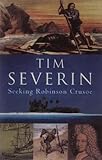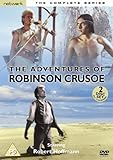Robinson Crusoe is the tale of a lonely human being who manages to survive shipwreck and confinement on a deserted island for years without human companionship. It was written by Daniel Defoe and was published to enormous acclaim in 1719. It is a story about the different ways that men cope with reality when hardship comes, but it is also the tale of a man creating his own reality, rescuing another man (Friday), and fashioning his own world out of the untamed wilderness of a desert island.
In writing Robinson Crusoe, Defoe created a character who appeals to us on a deep level. The search for Defoe’s model or models continues, with Alexander Selkirk being the favourite. Tim Severin (Seeking Robinson Crusoe , 2002) has recently explored the intriguing possibilities, and visited likely island locations for the story,  such as Juan Fernández, Chile, and Salt Tortuga, Venezuela.
such as Juan Fernández, Chile, and Salt Tortuga, Venezuela.
Loneliness is not the same as being alone. Many people have times when they are alone through circumstances or choice. Being alone can be experienced as positive, pleasurable, and emotionally refreshing if it is under the individual’s control. Solitude is the state of being alone and secluded from other people, and often implies having made a conscious choice to be alone. Loneliness is unwanted solitude. Loneliness does not require being alone and is experienced even in crowded places. It can be described as the absence of identification, understanding or compassion. Loneliness can be described as a feeling of isolation from other individuals, regardless of whether one is physically isolated from others or not.
As Robinson Crusoe survives on his island and adapts well to his surroundings, he becomes lonely and wishes for some companionship. During his stay on the island Crusoe trains a parrot to speak to him just so he can hear another voice, even though it is just a repetition of his own words. The psychological condition of Robinson Crusoe was not just totally imagined by Daniel Defoe. Defoe was not a stranger to the life of imprisonment. In the early 18th century, Defoe was imprisoned for about six months. He was thrown in jail because of a controversial pamphlet that he wrote. This imprisonment may have given Defoe thoughts of what it is like to be cut off from civilization. One may see the severity of Crusoe’s loneliness and lack of human companionship after an illness. Reminiscent of David, writer of the Bible book of Psalms, Crusoe prays to God asking him why he has being punished in such a cruel manner. This gives the reader an idea of how Crusoe is feeling at that time. He is extremely unhappy with his condition and that he has nobody to speak to.
Today, as a society, we appear increasingly afraid of being alone. In the recent film Cast Away [DVD] [2001] , one might describe the character of Chuck Noland, played convincingly by Tom Hanks, as the latest reincarnation of Robinson Crusoe. He creates a friend and companion during his four year confinement, in Wilson, a volleyball, in one scene, risking his life to avoid losing him. This would not be true to life if we could not identify with the yearning for companionship implied.
, one might describe the character of Chuck Noland, played convincingly by Tom Hanks, as the latest reincarnation of Robinson Crusoe. He creates a friend and companion during his four year confinement, in Wilson, a volleyball, in one scene, risking his life to avoid losing him. This would not be true to life if we could not identify with the yearning for companionship implied.
Many psychologists encourage patients to use cognitive therapy to overcome anxiety and depression, as well as other conditions characterized by negative thought patterns. In cognitive therapy, a patient attempts to change the way he thinks. Some patients are encouraged to write down their irrational, negative thoughts and counter them with rational, positive thoughts in what is intended to be an honest appraisal of their thought processes. The value of writing as therapy has long been recognized. Seeing the results on paper can put matters in perspective. Crusoe performs such a writing exercise in Chapter IV (“First Weeks on the Island”):
I now began to consider seriously my condition, and the circumstances I was reduced to; and I drew up the state of my affairs in writing, not so much to leave them to any that were to come after me – for I was likely to have but few heirs – as to deliver my thoughts from daily poring over them, and afflicting my mind; and as my reason began now to master my despondency, I began to comfort myself as well as I could, and to set the good against the evil, that I might have something to distinguish my case from worse; and I stated very impartially, like debtor and creditor, the comforts I enjoyed against the miseries I suffered, thus:-
Evil: I am cast upon a horrible, desolate island, void of all hope of recovery.
Good: But I am alive; and not drowned, as all my ship’s company were, etc.
Upon the whole, here was an undoubted testimony that there was scarce any condition in the world so miserable but there was something negative or something positive to be thankful for in it; and let this stand as a direction from the experience of the most miserable of all conditions in this world: that we may always find in it something to comfort ourselves from, and to set, in the description of good and evil, on the credit side of the account.
In his isolation from the rest of the world, Crusoe is able to create a society that not only he depends on for survival, but is also dependent on him. Of course, there are no other people to corrupt or destroy the harmony in which Crusoe is living in with nature. “It was now that I began sensibly to feel how much more happy this life I now led was than the wicked, cursed, abominable life I led all the past part of my days”. As Defoe depicts it, Crusoe’s solitary confinement, even though an event that he viewed as being a punishment from God for his sins in the beginning, has really caused him to become “enlightened” and has also made him realize that his new life was by far better than that in England. “The state of nature which Crusoe has lived, a solitary life on the island, possessed a purity that cannot be duplicated”, even making him say, “I cared not if I was never to remove from the place where I lived” and “I lived there..perfectly and completely happy, if any such thing as complete happiness can be formed in a sublunary state”.
“In Robinson Crusoe, Defoe has hit upon a situation that asks to be worked out. The episodes arise naturally from the situation, and the situation is such that it leads naturally to a complete change in the hero’s outlook, and ultimately to a solution of his problems” J R Sutherland ( Robinson Crusoe and Other Writings ). The island had an effect on Crusoe that went deeper than the sole purpose for his survival. It caused Crusoe to develop mentally, physically, and spiritually. “Crusoe began as a wanderer, aimless on the sea he does not understand; he ends as a pilgrim crossing a final mountain to enter the promised land”. It is the confinement of the island that finally makes Crusoe stop running away from his problems and face both his fears and his reality. Crusoe learns that by working with his surroundings, rather than raging against his misfortune, he is able to find and use everything he needs in order to carry out life.
Along with the criticism of his society, Defoe is able to give symbolism to the objects around Crusoe that support the idea of the perfect society. The new-grown barley and corn on the island, which Crusoe calls a “prodigy of Nature”, is really symbolic of the spiritual and emotional growth that is taking place within himself. These grains, however, were also a main source of food for Crusoe. The island itself has symbolic significance because it is the physical means which arrested Crusoe in his wanderings. The confinement found on the island is what is mostly responsible for the growth in which took place within Crusoe.
Though Crusoe has developed throughout the novel to accept what has become of him, near the end, the reader sees that loneliness has started to take its toll. He is able to sustain life by himself, but also misses the contact that he had in society. Though Crusoe found his island sanctuary and created this flawless home, humans are social beings, and need the contact that does not come with living in solitude.
What explains the universal appeal of Crusoe? Why do so many people, regardless of age, social class, intellectual level, and culture, admire Crusoe?
- The thrill of adventure lures us into identifying with Crusoe and his triumph over mishaps, particularly since the specific details of Defoe’s portrayal make his experiences real for us.
- English readers often see Crusoe as the typical Englishman–manly, self-reliant, courageous, heroic, and resourceful. This narrow chauvinistic response excludes non-English readers, yet Crusoe transcends national, religious, and cultural boundaries. The French, in particular, have had a longstanding affection for Crusoe. They admired him as a man of heroic stature, a man who overcame dire adversities. During the French Revolution, Crusoe’s courage, independence, and determination reflected the spirit and values of the Revolution.
- Coleridge saw Crusoe as ‘everyman’, as “a representative of humanity in general; neither his intellectual nor his moral qualities set him above the middle degree of mankind….” He is “the universal representative, the person for whom every reader could substitute himself. But now nothing is done, thought, or suffered, or desired, but what every man can imagine himself doing, thinking, feeling, or wishing for.” (1832).
- The division of labour and industrialization have cut off modern men and women from simple tasks; we no longer know the whole process of basic activities, like growing wheat, milling flour, and baking bread. This was true in Defoe’s time also, though to a lesser extent. So the details of Crusoe’s everyday life fascinate us, as we watch him recreate civilization alone. He makes us look at the activities and necessities of everyday life in a new way, and we enjoy each discovery with Crusoe.
- Back at the beginning, in the Garden of Eden, God said, “It is not good for man to continue by himself..” (Gen.2:18), and so he created Eve. The experiences of man, as symbolised by Robinson Crusoe, bear this out.
Site about Juan Fernández Island, Chile, http://www.rcrusoe.org/
See David Cotterell’s book St Elmo’s Fire at: http://www.fast-print.net/view/St Elmo’s Fire
Tim Severin homepage: http://www.timseverin.net/
Help for loneliness: http://www.mind.org.uk/help/diagnoses_and_conditions/loneliness
